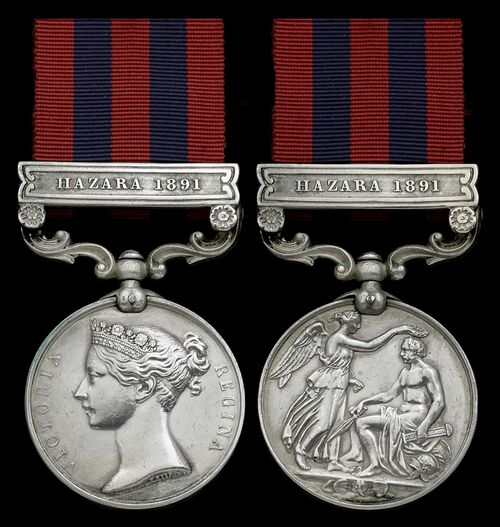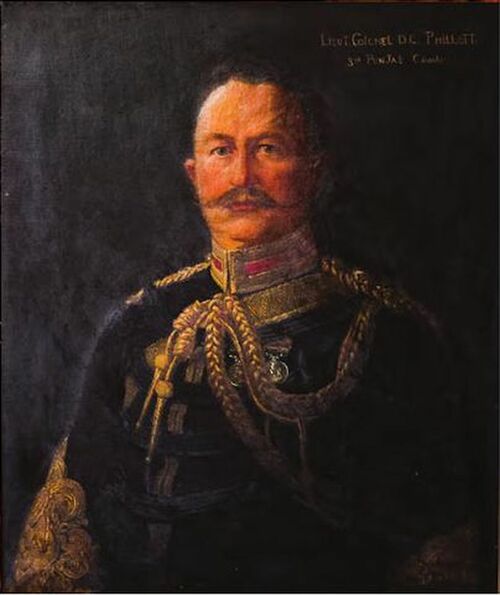Auction: 23001 - Orders, Decorations and Medals
Lot: 27
The India General Service Medal awarded to Lieutenant-Colonel D. C. Phillott, who served as Deputy Assistant Quartermaster-General with the Hazara Field Force, served under the famous Percy Sykes in Perisa, later himself becoming British Consul to Persia and a respected Asiatic scholar
India General Service 1854-95, 1 clasp, Hazara 1891 (Captn. D. C. Phillott S.C.), edge bruise, very fine
Douglas Craven Phillott was born in India on 28 June 1860, the son of Lilias and Lieutenant-Colonel Henry Phillott of 2 Golden Manor, Hanwell. His father served with the Indian Army and the younger Phillott followed in his footsteps: having been educated at Felsted School, Essex he went on to study at the Royal Military Academy, Sandhurst.
Commissioned 2nd Lieutenant with the 40th Foot on 14 January 1880 he was promoted Lieutenant with the South Lancashire Regiment the next year, on 1 July 1881. Posted to the Bengal Staff Corps on 8 July 1885 he served attached to the 28th (Punjab) Bengal Native Infantry as Wing Officer and Officiating Quartermaster at Headquarters Jullander. With this unit he served with the Draband Column and later the Zhob Valley Field Force in 1890. Promoted Captain on 14 January 1891 while stationed with the 3rd Punjab Cavalry as a Squadron Officer at Kohat.
At this time a British Force, named the Hazara Field Force, under the command of Major-General W. Ellis launched the Black Mountain Expedition. Phillott was appointed Deputy Assistant Quartermaster-General with this force, serving throughout the expedition with the Staff Corps. The Field Force was extremely successful despite the fierce resistance and difficult conditions of the North-West Frontier.
Phillott saw further service there on the Samana and Tirah expeditions between 1897-8 (Medal and two clasps). Promoted Major on 14 January 1900; his time on the North-West Frontier and in India more broadly had given him an important grounding in eastern cultures, experience that would prove important in his next posting to the British Consulate in Persia.
Here he served under the famous Consul Percy Sykes, mainstay of the British presence in the region and later founder of the South Persia Rifles. Sykes left his position to travel in 1900 with Phillott, as the next most senior officer, taking his place as Consul for the next two years. Sykes’s return ended Phillott’s tenure, a return filled with an exuberance typical of the man, Persia in the Great Game by Antony Wynn refers:
‘On 4th January 1902 they were met outside Kerman by Major Phillott of the 1st Punjab Cavalry, who had been acting as Consul during Sykes’s two-year absence, and by two of Sykes’s Persian friends who had braved the bitter cold to ride out of town to greet him with proper Persian ceremony. They entered Kerman in English-built landaus with the coach springs lashed down with cords to stop the passengers being bounced right out of them; there was no road and they flew in to the Consulate at a terrifying gallop over ditches, streams and irrigation channels, ridges, furrows and pot-holes that would have astounded any English coachman.’
Not long after this Phillott was posted to the 23rd Cavalry (Frontier Force), being promoted Lieutenant-Colonel with this unit on 14 January 1906. By the outbreak of the Great War he was working for the India Officer and with the opening of hostilities took on the role of Chief Censor, Prisoner of War Central Bureau, Cairo. Thought it is possible that by the end of the war he also saw some service in the Russian theatre - given his Persian connections it is not hard to imagine a need for his services here.
Retiring from Public service after the war Phillott went on to put his knowledge to good use, translating a number of texts from Persian to English and writing in several journals on a range of topics from history and linguistics to falconry - the latter a sport he had developed a taste for in Persia. He held various academic positions including lecturer in Hindustani at Cambridge University, Persian Lecturer at Calcutta University, Trustee and Treasurer of the Indian Museum and General Secretary of the Asiatic Society of Bengal. With that last organisation he twice won gold medals for linguistic achievement, once for Persian and once for Urdu.
Phillott lived the final years of his life near his old school at Felsted, Bury, Essex. He died on 11 September 1930 and is buried at Felstead Church, Essex; sold together typed and handwritten notes as well as copied research comprising London Gazette entries, two Who Was Who entries, a copy of from Sepoy to Subadar edited by the recipient, an obituary and extracts from Army Lists, an M.I.C., Medal rolls and biographical information.
Subject to 20% VAT on Buyer’s Premium. For more information please view Terms and Conditions for Buyers.
Sold for
£350
Starting price
£130







